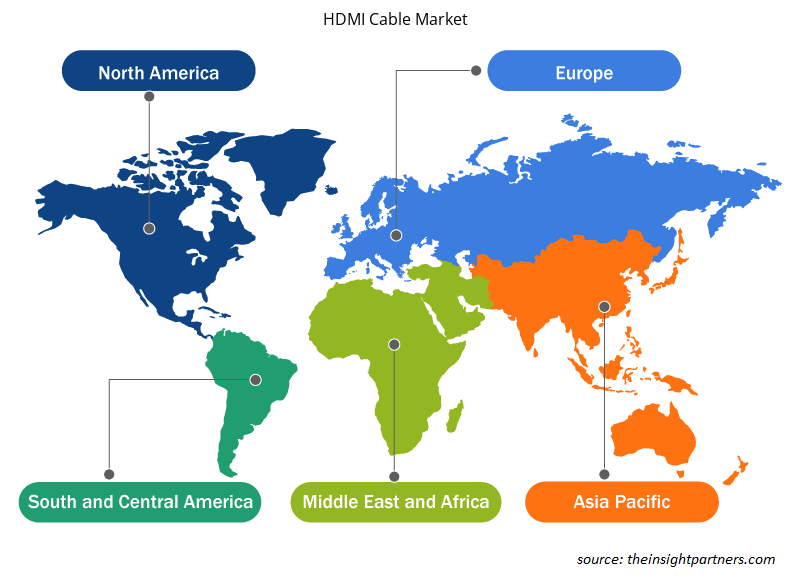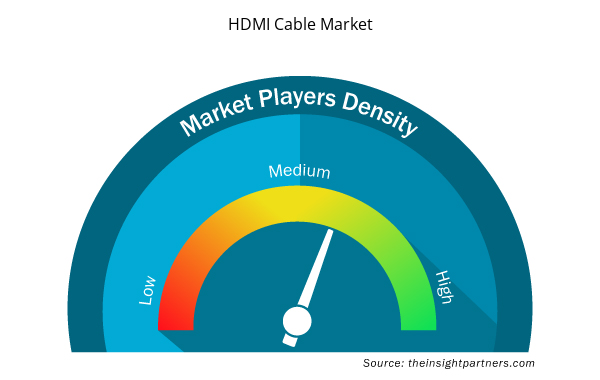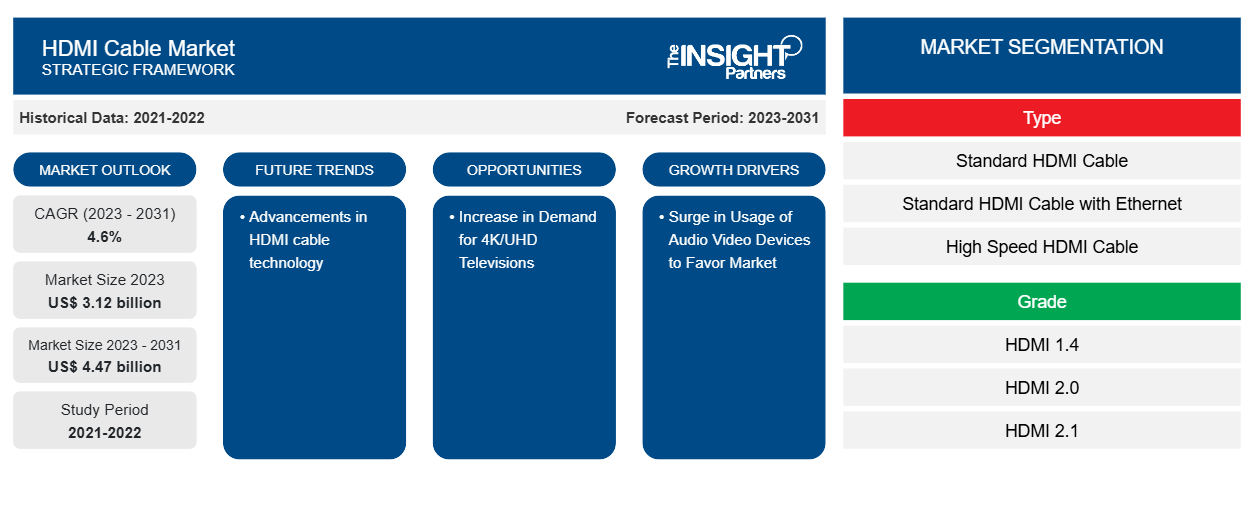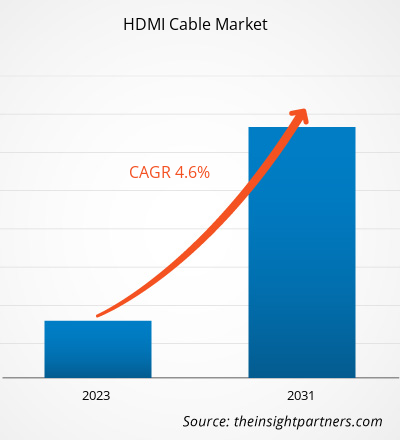Der Markt für HDMI-Kabel soll von 3,12 Milliarden US-Dollar im Jahr 2023 auf 4,47 Milliarden US-Dollar im Jahr 2031 wachsen, wobei von 2023 bis 2031 eine durchschnittliche jährliche Wachstumsrate von 4,6 % erwartet wird. Die Fortschritte in der HDMI-Kabeltechnologie werden voraussichtlich weiterhin die wichtigsten Trends auf dem HDMI-Kabelmarkt bleiben.
HDMI-Kabel-Marktanalyse
Die zunehmende Nutzung von Audio- und Videogeräten wie Fernsehern, Spielkonsolen und Audioplayern ist ein wichtiger Treiber für den HDMI-Kabelmarkt. Die Nachfrage nach HDMI-Kabeln ist direkt mit der Notwendigkeit verbunden, diese Geräte zu verbinden und eine qualitativ hochwertige Audio- und Videoübertragung sicherzustellen.
Marktübersicht für HDMI-Kabel
HDMI steht für High-Definition Multimedia Interface und ist ein weit verbreitetes Kabel zur Übertragung hochauflösender Audio- und Videosignale zwischen Geräten. Es wird häufig in Display-Controllern, Computermonitoren, digitalen Fernsehern und anderen audiovisuellen (AV-)Geräten sowohl in gewerblichen als auch in privaten Umgebungen verwendet.
Darüber hinaus ist HDMI im geschäftlichen und institutionellen Bereich zum Standard für die Übertragung hochwertiger Audio- und Videosignale zwischen Geräten geworden. Es wird häufig in den Bereichen Bildung, Präsentationen, digitale Beschilderung und Einzelhandelsdisplays verwendet. HDMI ist auch zunehmend auf Laptops und PCs verfügbar, was seine Position als bevorzugte Schnittstelle für Unternehmens- und kommerzielle Märkte weiter festigt.
Passen Sie diesen Bericht Ihren Anforderungen an
Sie erhalten kostenlos individuelle Anpassungen an jedem Bericht, einschließlich Teilen dieses Berichts oder einer Analyse auf Länderebene, eines Excel-Datenpakets sowie tolle Angebote und Rabatte für Start-ups und Universitäten.
- Holen Sie sich die wichtigsten Markttrends aus diesem Bericht.Dieses KOSTENLOSE Beispiel umfasst eine Datenanalyse von Markttrends bis hin zu Schätzungen und Prognosen.
Treiber und Chancen auf dem HDMI-Kabelmarkt
Anstieg der Nutzung von Audio-Video-Geräten begünstigt den Markt
Die Nutzung audiovisueller Multimediageräte mit HDMI-Anschlüssen hat stark zugenommen. Dieses Wachstum ist auf die zunehmende Verbreitung moderner Technologien wie das Internet der Dinge (IoT) und künstliche Intelligenz (KI) zurückzuführen, die zu einer höheren Nachfrage nach audiovisuellen Geräten wie Heimkinosystemen mit HDMI-Anschlüssen geführt haben. Diese Systeme integrieren oft KI-Software wie Alexa und Google Assistant und bieten den Verbrauchern integrierte Intelligenz und Komfort. Folglich wird erwartet, dass der Privatmarkt einen deutlichen Anstieg der Nachfrage nach HDMI-Kabeln erleben wird. Diese Nachfrage wird noch weiter angeheizt durch die Verbreitung von Multimediageräten wie DVD-Playern und Musiksystemen, die Anschlüsse für eine nahtlose Integration mit Videopanels und umgekehrt benötigen. Insbesondere das Bose Lifetime 650 Home Entertainment System ist für die AV-E/A-Unterstützung auf HDMI-Kabel angewiesen.
Steigende Nachfrage nach 4K/UHD-Fernsehern
Die sinkenden Kosten für Fernseher aufgrund von Fortschritten in der Displaytechnologie haben eine große Verbraucherbasis aus den Mittelschichtsschichten angezogen. Infolgedessen hat die Nutzung von 4K- oder Ultra-High-Definition-Fernsehern in Wohnumgebungen deutlich zugenommen. Diese Fernseher bieten mehrere HDMI-Anschlüsse, die hohe Übertragungsraten unterstützen, sodass Benutzer verschiedene Unterhaltungssysteme wie Spielekonsolen und Heimkinosysteme anschließen können. Die Verfügbarkeit von Funktionen wie 4 HDMI-Eingängen, HDCP2.3, HDMI-CEC und HDMI Audio Return Channel (ARC) erhöht die Nachfrage nach HDMI-Kabeln weiter. Dieser Trend wird durch die Weiterentwicklung von Fernsehern und die Bereitstellung mehrerer HDMI-Anschlüsse vorangetrieben, die den wachsenden Anforderungen der Verbraucher im Wohnbereich gerecht werden.
Segmentierungsanalyse des HDMI-Kabelmarktberichts
Wichtige Segmente, die zur Ableitung der HDMI-Kabelmarktanalyse beigetragen haben, sind Typ, Klasse und Anwendung.
- Nach Typ ist der Markt in Standard-HDMI-Kabel, Standard-HDMI-Kabel mit Ethernet, High-Speed-HDMI-Kabel und High-Speed-HDMI-Kabel mit Ethernet unterteilt. Das Segment Standard-HDMI-Kabel hatte im Jahr 2023 einen größeren Marktanteil.
- Basierend auf der Qualität ist der Markt in HDMI 1.4, HDMI 2.0 und HDMI 2.1 unterteilt. Das HDMI 2.0-Segment hatte im Jahr 2023 einen größeren Marktanteil.
- In Bezug auf die Anwendungen ist der Markt in Spielkonsolen, Player und Fernseher, Mobiltelefone, PCs und Tablets sowie Automobilsysteme unterteilt. Das Segment der Spielkonsolen hatte im Jahr 2023 einen größeren Marktanteil.
Marktanteilsanalyse für HDMI-Kabel nach geografischer Lage
Der geografische Umfang des HDMI-Kabelmarktberichts ist hauptsächlich in fünf Regionen unterteilt: Nordamerika, Asien-Pazifik, Europa, Naher Osten und Afrika sowie Südamerika/Süd- und Mittelamerika. Nordamerika hat den HDMI-Kabelmarkt im Jahr 2023 dominiert. Die Entwicklung von Multimedia- und Audio-/Videogeräten hat zu einer zunehmenden Verbreitung von HDMI-Kabeln in Nordamerika, insbesondere in den USA, geführt. Fortschritte in der Displaytechnologie werden voraussichtlich den Marktanteil von HDMI-Kabeln erhöhen. Der exponentielle Aufstieg des Internets in Nordamerika hat die Nachfrage nach HDMI-Kabeln zur Signalübertragung erhöht. Fortschritte bei Anzeigegeräten haben einen neuen Trend ausgelöst, wie beispielsweise HDMI-Kabel für 4K, 8K und andere Auflösungen. Nordamerika trägt erheblich zum Wachstum der HDMI-Kabelindustrie bei. Laut einer in Nordamerika durchgeführten Umfrage von eShopWorld, einem in Irland ansässigen Unternehmen, das für die Expansion des E-Commerce-Marktes bekannt ist, sagten mehr als 84 % der Kunden, dass HDMI-Kabel für 4K, 8K und andere Auflösungen geeignet sind.
Regionale Einblicke in den HDMI-Kabelmarkt
Die regionalen Trends und Faktoren, die den HDMI-Kabelmarkt während des Prognosezeitraums beeinflussen, wurden von den Analysten von Insight Partners ausführlich erläutert. In diesem Abschnitt werden auch HDMI-Kabelmarktsegmente und -geografie in Nordamerika, Europa, im asiatisch-pazifischen Raum, im Nahen Osten und Afrika sowie in Süd- und Mittelamerika erörtert.

- Erhalten Sie regionale Daten zum HDMI-Kabelmarkt
Umfang des HDMI-Kabel-Marktberichts
| Berichtsattribut | Details |
|---|---|
| Marktgröße im Jahr 2023 | 3,12 Milliarden US-Dollar |
| Marktgröße bis 2031 | 4,47 Milliarden US-Dollar |
| Globale CAGR (2023 - 2031) | 4,6 % |
| Historische Daten | 2021-2022 |
| Prognosezeitraum | 2023–2031 |
| Abgedeckte Segmente | Nach Typ
|
| Abgedeckte Regionen und Länder | Nordamerika
|
| Marktführer und wichtige Unternehmensprofile |
|
Marktdichte von HDMI-Kabeln: Auswirkungen auf die Geschäftsdynamik verstehen
Der Markt für HDMI-Kabel wächst rasant, angetrieben durch die steigende Nachfrage der Endnutzer aufgrund von Faktoren wie sich entwickelnden Verbraucherpräferenzen, technologischen Fortschritten und einem größeren Bewusstsein für die Vorteile des Produkts. Mit steigender Nachfrage erweitern Unternehmen ihr Angebot, entwickeln Innovationen, um die Bedürfnisse der Verbraucher zu erfüllen, und nutzen neue Trends, was das Marktwachstum weiter ankurbelt.
Die Marktteilnehmerdichte bezieht sich auf die Verteilung von Firmen oder Unternehmen, die in einem bestimmten Markt oder einer bestimmten Branche tätig sind. Sie gibt an, wie viele Wettbewerber (Marktteilnehmer) in einem bestimmten Marktraum im Verhältnis zu seiner Größe oder seinem gesamten Marktwert präsent sind.
Die wichtigsten auf dem HDMI-Kabelmarkt tätigen Unternehmen sind:
- Belkin International
- Reines Fi
- Sony Corporation
- Hitachi
- Kramer Electronics Ltd.
- Aten Advance
Haftungsausschluss : Die oben aufgeführten Unternehmen sind nicht in einer bestimmten Reihenfolge aufgeführt.

- Überblick über die wichtigsten Akteure auf dem HDMI-Kabelmarkt
Neuigkeiten und aktuelle Entwicklungen zum HDMI-Kabelmarkt
Der HDMI-Kabelmarkt wird durch die Erfassung qualitativer und quantitativer Daten nach Primär- und Sekundärforschung bewertet, die wichtige Unternehmensveröffentlichungen, Verbandsdaten und Datenbanken umfasst. Im Folgenden finden Sie eine Liste der Entwicklungen auf dem Markt:
- Im Dezember 2022 stellte ATEN Advanced, der branchenführende Anbieter von AV/IT-Konnektivitäts- und Verwaltungslösungen, den CS22HF 2-Port USB FHD HDMI Cable KVM-Switch vor, der die Effizienz der Arbeitsabläufe steigern soll. Der CS22HF ermöglicht das nahtlose Umschalten zwischen zwei Computern per Knopfdruck. Um beide Computer zu steuern, müssen Benutzer lediglich eine Desktop-Konsole mit einer einzigen Maus, Tastatur und einem einzigen Display konfigurieren und dabei USB- und HDMI-Verbindungen nutzen.
(Quelle: ATEN Advance, Pressemitteilung, 2022)
- Im November 2022 stellte Pure-Fi, ein führender Anbieter von Premium-Konnektivitätslösungen für den professionellen audiovisuellen (Pro A/V) Markt, sein neues Ultra-High-Speed HDMI Active Optical Cable (AOC) vor. Dieses innovative Kabel unterstützt HDMI 2.1a-Funktionen, einschließlich der Übertragung von 8K-Videoinhalten bei 60 Hz über größere Entfernungen. Das Ultra-High-Speed HDMI AOC ist speziell auf den Pro A/V-Einsatz zugeschnitten und eignet sich ideal für Digital Signage-Anwendungen.
(Quelle: Pure-Fi, Pressemitteilung, 2022)
Marktbericht zum HDMI-Kabel: Abdeckung und Ergebnisse
Der Bericht „Marktgröße und Prognose für HDMI-Kabel (2021–2031)“ bietet eine detaillierte Analyse des Marktes, die die folgenden Bereiche abdeckt:
- Marktgröße und Prognose auf globaler, regionaler und Länderebene für alle wichtigen Marktsegmente, die im Rahmen des Projekts abgedeckt sind
- Marktdynamik wie Treiber, Beschränkungen und wichtige Chancen
- Wichtige Zukunftstrends
- Detaillierte PEST/Porters Five Forces- und SWOT-Analyse
- Globale und regionale Marktanalyse mit wichtigen Markttrends, wichtigen Akteuren, Vorschriften und aktuellen Marktentwicklungen
- Branchenlandschaft und Wettbewerbsanalyse, einschließlich Marktkonzentration, Heatmap-Analyse, prominenten Akteuren und aktuellen Entwicklungen
- Detaillierte Firmenprofile
- Historische Analyse (2 Jahre), Basisjahr, Prognose (7 Jahre) mit CAGR
- PEST- und SWOT-Analyse
- Marktgröße Wert/Volumen – Global, Regional, Land
- Branche und Wettbewerbsumfeld
- Excel-Datensatz


- Military Rubber Tracks Market
- Blood Collection Devices Market
- Sports Technology Market
- Third Party Logistics Market
- Integrated Platform Management System Market
- Fixed-Base Operator Market
- Dried Blueberry Market
- Artificial Intelligence in Healthcare Diagnosis Market
- Dry Eye Products Market
- Webbing Market

Report Coverage
Revenue forecast, Company Analysis, Industry landscape, Growth factors, and Trends

Segment Covered
This text is related
to segments covered.

Regional Scope
North America, Europe, Asia Pacific, Middle East & Africa, South & Central America

Country Scope
This text is related
to country scope.
Häufig gestellte Fragen
The HDMI Cable market size is expected to grow from US$ 3.12 billion in 2023 to US$ 4.47 billion by 2031; it is anticipated to expand at a CAGR of 4.6% from 2024 to 2031.
The surge in usage of audio video devices is a driving are among the major factors that propel the global HDMI Cable market.
The advancements in HDMI cable technology is anticipated to play a significant role in the global HDMI Cable Market in the coming years.
The global HDMI Cable market is expected to reach US$ 4.47 billion by 2031.
The key players holding the majority of shares in the global HDMI Cable market are Belkin International, Pure-Fi, Sony Corporation, Hitachi, and Kramer Electronics Ltd.
Trends and growth analysis reports related to Electronics and Semiconductor : READ MORE..
The Insight Partners performs research in 4 major stages: Data Collection & Secondary Research, Primary Research, Data Analysis and Data Triangulation & Final Review.
- Data Collection and Secondary Research:
As a market research and consulting firm operating from a decade, we have published and advised several client across the globe. First step for any study will start with an assessment of currently available data and insights from existing reports. Further, historical and current market information is collected from Investor Presentations, Annual Reports, SEC Filings, etc., and other information related to company’s performance and market positioning are gathered from Paid Databases (Factiva, Hoovers, and Reuters) and various other publications available in public domain.
Several associations trade associates, technical forums, institutes, societies and organization are accessed to gain technical as well as market related insights through their publications such as research papers, blogs and press releases related to the studies are referred to get cues about the market. Further, white papers, journals, magazines, and other news articles published in last 3 years are scrutinized and analyzed to understand the current market trends.
- Primary Research:
The primarily interview analysis comprise of data obtained from industry participants interview and answers to survey questions gathered by in-house primary team.
For primary research, interviews are conducted with industry experts/CEOs/Marketing Managers/VPs/Subject Matter Experts from both demand and supply side to get a 360-degree view of the market. The primary team conducts several interviews based on the complexity of the markets to understand the various market trends and dynamics which makes research more credible and precise.
A typical research interview fulfils the following functions:
- Provides first-hand information on the market size, market trends, growth trends, competitive landscape, and outlook
- Validates and strengthens in-house secondary research findings
- Develops the analysis team’s expertise and market understanding
Primary research involves email interactions and telephone interviews for each market, category, segment, and sub-segment across geographies. The participants who typically take part in such a process include, but are not limited to:
- Industry participants: VPs, business development managers, market intelligence managers and national sales managers
- Outside experts: Valuation experts, research analysts and key opinion leaders specializing in the electronics and semiconductor industry.
Below is the breakup of our primary respondents by company, designation, and region:

Once we receive the confirmation from primary research sources or primary respondents, we finalize the base year market estimation and forecast the data as per the macroeconomic and microeconomic factors assessed during data collection.
- Data Analysis:
Once data is validated through both secondary as well as primary respondents, we finalize the market estimations by hypothesis formulation and factor analysis at regional and country level.
- Macro-Economic Factor Analysis:
We analyse macroeconomic indicators such the gross domestic product (GDP), increase in the demand for goods and services across industries, technological advancement, regional economic growth, governmental policies, the influence of COVID-19, PEST analysis, and other aspects. This analysis aids in setting benchmarks for various nations/regions and approximating market splits. Additionally, the general trend of the aforementioned components aid in determining the market's development possibilities.
- Country Level Data:
Various factors that are especially aligned to the country are taken into account to determine the market size for a certain area and country, including the presence of vendors, such as headquarters and offices, the country's GDP, demand patterns, and industry growth. To comprehend the market dynamics for the nation, a number of growth variables, inhibitors, application areas, and current market trends are researched. The aforementioned elements aid in determining the country's overall market's growth potential.
- Company Profile:
The “Table of Contents” is formulated by listing and analyzing more than 25 - 30 companies operating in the market ecosystem across geographies. However, we profile only 10 companies as a standard practice in our syndicate reports. These 10 companies comprise leading, emerging, and regional players. Nonetheless, our analysis is not restricted to the 10 listed companies, we also analyze other companies present in the market to develop a holistic view and understand the prevailing trends. The “Company Profiles” section in the report covers key facts, business description, products & services, financial information, SWOT analysis, and key developments. The financial information presented is extracted from the annual reports and official documents of the publicly listed companies. Upon collecting the information for the sections of respective companies, we verify them via various primary sources and then compile the data in respective company profiles. The company level information helps us in deriving the base number as well as in forecasting the market size.
- Developing Base Number:
Aggregation of sales statistics (2020-2022) and macro-economic factor, and other secondary and primary research insights are utilized to arrive at base number and related market shares for 2022. The data gaps are identified in this step and relevant market data is analyzed, collected from paid primary interviews or databases. On finalizing the base year market size, forecasts are developed on the basis of macro-economic, industry and market growth factors and company level analysis.
- Data Triangulation and Final Review:
The market findings and base year market size calculations are validated from supply as well as demand side. Demand side validations are based on macro-economic factor analysis and benchmarks for respective regions and countries. In case of supply side validations, revenues of major companies are estimated (in case not available) based on industry benchmark, approximate number of employees, product portfolio, and primary interviews revenues are gathered. Further revenue from target product/service segment is assessed to avoid overshooting of market statistics. In case of heavy deviations between supply and demand side values, all thes steps are repeated to achieve synchronization.
We follow an iterative model, wherein we share our research findings with Subject Matter Experts (SME’s) and Key Opinion Leaders (KOLs) until consensus view of the market is not formulated – this model negates any drastic deviation in the opinions of experts. Only validated and universally acceptable research findings are quoted in our reports.
We have important check points that we use to validate our research findings – which we call – data triangulation, where we validate the information, we generate from secondary sources with primary interviews and then we re-validate with our internal data bases and Subject matter experts. This comprehensive model enables us to deliver high quality, reliable data in shortest possible time.


 Holen Sie sich ein kostenloses Muster für diesen Bericht
Holen Sie sich ein kostenloses Muster für diesen Bericht